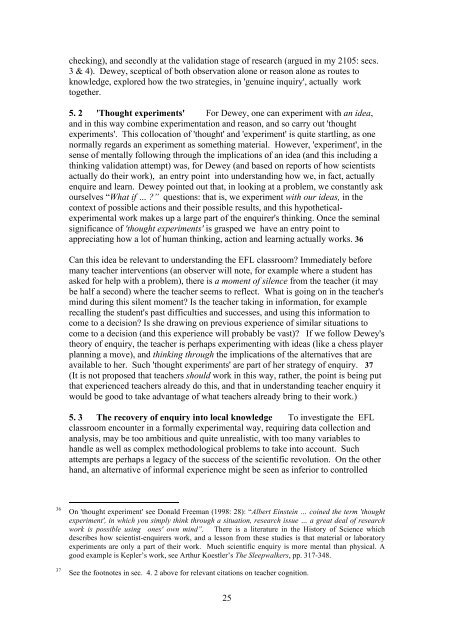RADICAL TEFL
2hqhXJd
2hqhXJd
You also want an ePaper? Increase the reach of your titles
YUMPU automatically turns print PDFs into web optimized ePapers that Google loves.
checking), and secondly at the validation stage of research (argued in my 2105: secs.<br />
3 & 4). Dewey, sceptical of both observation alone or reason alone as routes to<br />
knowledge, explored how the two strategies, in 'genuine inquiry', actually work<br />
together.<br />
5. 2 'Thought experiments' For Dewey, one can experiment with an idea,<br />
and in this way combine experimentation and reason, and so carry out 'thought<br />
experiments'. This collocation of 'thought' and 'experiment' is quite startling, as one<br />
normally regards an experiment as something material. However, 'experiment', in the<br />
sense of mentally following through the implications of an idea (and this including a<br />
thinking validation attempt) was, for Dewey (and based on reports of how scientists<br />
actually do their work), an entry point into understanding how we, in fact, actually<br />
enquire and learn. Dewey pointed out that, in looking at a problem, we constantly ask<br />
ourselves “What if … ?” questions: that is, we experiment with our ideas, in the<br />
context of possible actions and their possible results, and this hypotheticalexperimental<br />
work makes up a large part of the enquirer's thinking. Once the seminal<br />
significance of 'thought experiments' is grasped we have an entry point to<br />
appreciating how a lot of human thinking, action and learning actually works. 36<br />
Can this idea be relevant to understanding the EFL classroom? Immediately before<br />
many teacher interventions (an observer will note, for example where a student has<br />
asked for help with a problem), there is a moment of silence from the teacher (it may<br />
be half a second) where the teacher seems to reflect. What is going on in the teacher's<br />
mind during this silent moment? Is the teacher taking in information, for example<br />
recalling the student's past difficulties and successes, and using this information to<br />
come to a decision? Is she drawing on previous experience of similar situations to<br />
come to a decision (and this experience will probably be vast)? If we follow Dewey's<br />
theory of enquiry, the teacher is perhaps experimenting with ideas (like a chess player<br />
planning a move), and thinking through the implications of the alternatives that are<br />
available to her. Such 'thought experiments' are part of her strategy of enquiry. 37<br />
(It is not proposed that teachers should work in this way, rather, the point is being put<br />
that experienced teachers already do this, and that in understanding teacher enquiry it<br />
would be good to take advantage of what teachers already bring to their work.)<br />
5. 3 The recovery of enquiry into local knowledge To investigate the EFL<br />
classroom encounter in a formally experimental way, requiring data collection and<br />
analysis, may be too ambitious and quite unrealistic, with too many variables to<br />
handle as well as complex methodological problems to take into account. Such<br />
attempts are perhaps a legacy of the success of the scientific revolution. On the other<br />
hand, an alternative of informal experience might be seen as inferior to controlled<br />
36<br />
37<br />
On 'thought experiment' see Donald Freeman (1998: 28): “Albert Einstein … coined the term 'thought<br />
experiment', in which you simply think through a situation, research issue … a great deal of research<br />
work is possible using ones' own mind”. There is a literature in the History of Science which<br />
describes how scientist-enquirers work, and a lesson from these studies is that material or laboratory<br />
experiments are only a part of their work. Much scientific enquiry is more mental than physical. A<br />
good example is Kepler’s work, see Arthur Koestler’s The Sleepwalkers, pp. 317-348.<br />
See the footnotes in sec. 4. 2 above for relevant citations on teacher cognition.<br />
25


